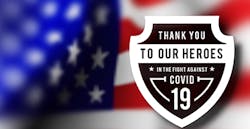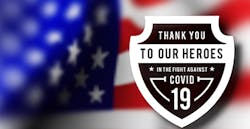The first responders, emergency room medical professionals, and others who cared for coronavirus patients during the pandemic are credited far and wide with heroic behavior. No one will argue the point. However, they are not the only professionals who behaved heroically during the pandemic. We must also include many home service professionals.
Before a service call during the shutdowns, it was common practice to ask the homeowner if anyone in the house was sick. If so, the decision was to reschedule the call for 14 days out if at all possible. But what it if wasn’t possible? What if getting the heating (in the north, during the first part of the pandemic) or the air conditioning (in parts of the Sunbelt, starting in April) was potentially a life and death situation? What then?
Ricky Cox, owner of Texas Total Comfort Systems in Fort Worth, faced exactly this dilemma. When it was 95 degrees, a woman in Fort Worth lost her air conditioner. He husband was in the hospital with Covid. The woman had it and was recovering, expecting to return to work in a couple of days. She was upfront with the first contractor she called. The company declined the call. So did the next. And the next. She reached out to her church for help. People in her church began calling. All told, over 40 companies declined to come out.
She described the process, “He called me that night and did a video chat with me to help determine the problem.”
Ricky says that being an essential service carries an obligation to do essential work. He says when you are in the military and conflict erupts, that is not the time to walk away.
Ricky used Facetime to have the woman show him the filter, the drain pan, etc. He couldn’t complete the diagnostic without coming to the home, but believed it was likely a compressor or capacitor so that he would not need to enter the home. He told the customer he would video everything he found and send her the video.
She continued, “He himself came out the next day to look at my AC. He was sad to tell me that it was not something that was an easy fix. In fact, what I really needed was a whole new unit.”
Like many consumers, she gulped at the price and had to get help from a family member to be able to afford a new system. When the installation crew arrived, they wore all of the right personal protective equipment, just like the health care workers.
The consumer commented on this in her review. She said, “The crew that came to install my unit were AWESOME!!! They never made me field weird that my home had been infected with the virus however they did take it serious and had masks and gloves the whole nine yards.”
She concluded by stating, “I would recommend them to ANYONE!!! The price is not cheap ‘because getting a new AC is not CHEAP,’ but Ricky has a GOOD business and no other company will give you the customer service like them. I am a believer!!!”
If the doctors and nurses caring for coronavirus patients are heroic, then so is Ricky Cox and Texas Total Comfort Systems. Ricky says that being an essential service carries an obligation to do essential work. He says when you are in the military and conflict erupts, that is not the time to walk away. That is not the way it works.
Clearly, there are different feelings about this. If a tech is concerned and does not want to go on a call, he cannot be forced. The same is true of our health care professionals, but they still go. We call them heroic as a result.
Randy Hilton, who worked for years as a licensed master plumber, is now a health care worker as an EMT, driving an ambulance. He noted, “It’s a personal decision and there are no perfect answers. The fact that you're out working, moving, active etc. already puts you into a safer category than most If you have COPD, are a heavy smoker, have diabetes, congestive heart failure or asthma you might be smart to avoid the job.”
Randy added, “I've been in the field and know the work conditions. This is no worse than what we work in every day. Now, I'm in an ambulance, picking up these people from homes, nursing homes etc. We have extra precautions when we know we have an infected patient.”
For the record, Ricky makes no claim on heroism. He says, “The way we do business doesn’t change! Customer Service is what we do ... Before During and After ... that sets us apart.”
Draw your own conclusions, but I think we do have heroes in home services.
Ricky is a member of the Service Roundtable and the Service Nation Alliance best practices group. Check out why he belongs at www.ServiceRoundtable.com or call 877.262.3341.
About the Author
Matt Michel
Chief Executive Officer
Matt Michel was a co-founder and CEO of the Service Roundtable (ServiceRoundtable.com). The Service Roundtable is an organization founded to help contractors improve their sales, marketing, operations, and profitability. The Service Nation Alliance is a part of this overall organization. Matt was inducted into the Contracting Business HVAC Hall of Fame in 2015. He is now an author and rancher.

